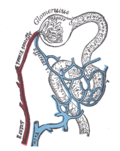Proximal tubule
(Redirected from Proximal convoluted tubule)
Proximal Tubule
The proximal tubule is a part of the nephron, the functional unit of the kidney. It is the first part of the renal tubule system and plays a crucial role in the reabsorption and secretion of various substances.
Structure
The proximal tubule is divided into two segments: the proximal convoluted tubule (PCT) and the proximal straight tubule (PST). The PCT is located in the renal cortex, while the PST extends into the renal medulla.
Function
The primary function of the proximal tubule is to reabsorb around 65% of the glomerular filtrate. This includes sodium, glucose, amino acids, and water. It also secretes substances such as hydrogen ions, ammonia, and urea.
Clinical Significance
Diseases of the proximal tubule can lead to various clinical conditions. For example, Fanconi syndrome is a disorder of the proximal tubule that results in the loss of essential substances in the urine. Renal tubular acidosis is another condition that can occur due to dysfunction of the proximal tubule.
See Also
References
Transform your life with W8MD's budget GLP-1 injections from $125.
W8MD offers a medical weight loss program to lose weight in Philadelphia. Our physician-supervised medical weight loss provides:
- Most insurances accepted or discounted self-pay rates. We will obtain insurance prior authorizations if needed.
- Generic GLP1 weight loss injections from $125 for the starting dose.
- Also offer prescription weight loss medications including Phentermine, Qsymia, Diethylpropion, Contrave etc.
NYC weight loss doctor appointments
Start your NYC weight loss journey today at our NYC medical weight loss and Philadelphia medical weight loss clinics.
- Call 718-946-5500 to lose weight in NYC or for medical weight loss in Philadelphia 215-676-2334.
- Tags:NYC medical weight loss, Philadelphia lose weight Zepbound NYC, Budget GLP1 weight loss injections, Wegovy Philadelphia, Wegovy NYC, Philadelphia medical weight loss, Brookly weight loss and Wegovy NYC
|
WikiMD's Wellness Encyclopedia |
| Let Food Be Thy Medicine Medicine Thy Food - Hippocrates |
Medical Disclaimer: WikiMD is not a substitute for professional medical advice. The information on WikiMD is provided as an information resource only, may be incorrect, outdated or misleading, and is not to be used or relied on for any diagnostic or treatment purposes. Please consult your health care provider before making any healthcare decisions or for guidance about a specific medical condition. WikiMD expressly disclaims responsibility, and shall have no liability, for any damages, loss, injury, or liability whatsoever suffered as a result of your reliance on the information contained in this site. By visiting this site you agree to the foregoing terms and conditions, which may from time to time be changed or supplemented by WikiMD. If you do not agree to the foregoing terms and conditions, you should not enter or use this site. See full disclaimer.
Credits:Most images are courtesy of Wikimedia commons, and templates, categories Wikipedia, licensed under CC BY SA or similar.
Contributors: Prab R. Tumpati, MD








